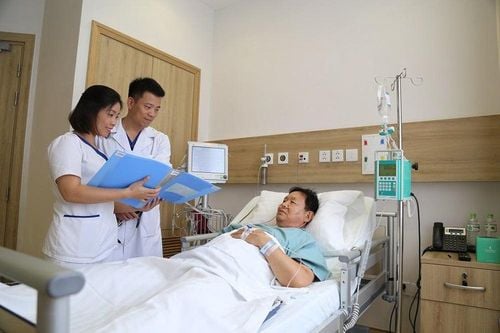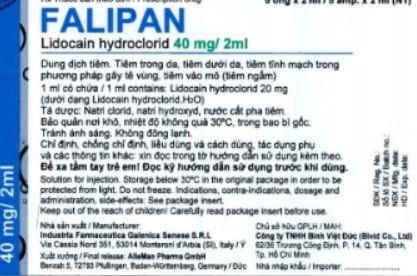This is an automatically translated article.
Article written by BSCK II. Nguyen Trung Thanh - Anesthesiologist - Anesthesiologist - Department of Surgical Anesthesia - Vinmec Central Park International General Hospital
In addition to the neurological problems that occur after surgery such as delayed or no consciousness related to drug use or disease and central nervous system abnormalities (including disorientation, psychosis or motor and spinal reflexes) occurs when awake, we also have problems with delirium and cognitive disorders that are very common after surgery in the elderly.
Advances in anesthesia as well as surgery have increased safety in anesthesiology in the elderly, but alongside the success of surgery, rates of delirium and post-operative cognitive disturbances have been observed in humans. quite old age. Not only because the brain is the target organ for anesthetics and drugs used during surgery, but also because the elderly brain is very vulnerable with age.
1. What is delirium?
Delirium is the most common form in the elderly after surgery, it is an acute disorder and erratic changes in cognition.
The basic features of delirium are:
Changes in mental status including: marked disturbance in concentration and decreased awareness of surroundings. Occurs acutely and lasts for several hours to several days. The changes are very erratic at each stage of the day.
2. Frequency
Occurs 10-15% in general surgery, over 30-50% in orthopedic and cardiac surgery. Delirium requires special monitoring and prolongs hospital stay, leading to increased treatment costs. In addition, delirium is associated with the development of dementia and increases the 1-year mortality rate.

Người bệnh có thể mất trí nhớ sau gây mê
3. Cause
The neurobiological mechanism is still unknown, one can only suggest factors that can lead to delirium such as hypoxia, drug interactions (especially anticholinergics, benzodiazebines, antidepressants) colds ), patients with alcoholism, depression, dementia, or certain metabolic disorders.
The factors above are not indicative of how surgery and anesthesia affect delirium. It is possible that surgery induces an inflammatory response and an acute inflammatory response occurs both peripherally and in the CSF so that delirium is more common in invasive surgery than in minor procedures.
The role of anesthesia in inducing delirium is complex. Some drugs such as ketamine, benzodiazepine, propofol cause delirium like anticholinergic drugs such as atropine, scopolamine. However, the rate of delirium did not differ between anesthesia and spinal or epidural anesthesia, especially in cases with deep sedation during anesthesia, the risk of delirium was higher.
4. Delirium during coma
Patient has involuntary actions or does not follow orders or the patient may be in a state of excitement. The awake form of delirium can occur at any age but is most commonly noticed in children. The cause is unknown but fortunately is usually self-limiting and does not require any special treatment other than nursing attention to the patient, good analgesia, and possibly sedation.
Delirium in the elderly does not occur during the coma. The patient may be in a state of excitement but is usually lethargic and inactive, occurring 24 or 72 hours postoperatively, after being fully awake. This form of delirium, which persists for a long time, can be confused with other cognitive disturbances that occur more slowly after surgery. This postoperative delirium is similar to ICU delirium and has been identified by Dr.Wes Ely et al as ICU
delirium.
5. Risk of delirium in elderly surgery
Over 70 years old, history of delirium in previous surgery, alcoholism, preoperative opiate use, history of depression, significant intraoperative blood loss, large volume of blood transfusion, postoperative Hct less than 30%, no Good pain relief after surgery.
Drugs that directly affect delirium are uncertain. The choice of anesthesia with spinal or epidural anesthesia or general anesthesia did not find a difference in the frequency of delirium.

Người cao tuổi có nguy cơ cao bị mê sảng trong phẫu thuật
6. Prevention
The best way to prevent it is to avoid risk factors, avoid or minimize the use of drugs that can cause delirium. Signs of delirium may also be an early sign of a serious systemic illness such as hypoxia, sepsis, or pain.
Because the pathogenesis of delirium and postoperative cognitive impairment is still unclear, it is difficult to suggest a specific preventive measure or an appropriate treatment regimen. Therefore, there is no scientific basis to suggest that a specific anesthetic or an anesthetic method is appropriate for an elderly patient.
After surgery, the patient needs to be carefully examined and monitored by doctors and nurses to make adjustments in the treatment regimen and handle possible complications. Therefore, patients should perform surgery at reputable medical facilities to ensure that the anesthetic process does not make mistakes.
Vinmec International General Hospital is a prestigious medical facility, with a team of experienced, highly qualified medical professionals with academic degrees and high degrees in the industry. Here, not only gathers a team of famous domestic doctors but also international doctors, bringing the most effective and new treatment regimens today.
Modern medical equipment system, fully equipped, comfortable facilities, clean environment, meeting the strict requirements of the Ministry of Health to help patients feel secure during treatment. To register for examination and treatment at Vinmec International General Hospital, you can contact the nationwide Vinmec Health System Hotline, or register online HERE.














